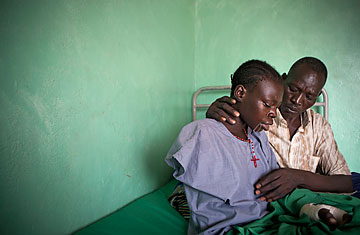
(3 of 3)
On paper, the south's 8 million to 10 million people are rich: as well as oil, their new country is blessed with millions of hectares of fertile land around the vast Sudd swamp, while cows — worth $250 to $400 a head — outnumber people. In reality, health, education and poverty indicators are among the worst in the world. Illiteracy and innumeracy are rife, and many development workers label South Sudan a "pre-failed state."
Can Diplomacy Help?
Could the world have done more to prevent this dual disaster? There have been missed opportunities. A $526 million international development effort in the south has been slow, and change is largely confined to Juba. The U.S. has dangled incentives before Khartoum — like an offer to remove it from its list of state sponsors of terrorism if it allowed a peaceful referendum — only to fail to deliver. The world also finds Sudan's complexity a challenge: campaigns such as Save Darfur and the Enough Project, featuring celebrities like George Clooney and Mia Farrow, bring welcome attention, but they oversimplify the issues. The U.N. peace mission is often impotent, as in Kadugli, where civilians were executed within sight of peacekeepers.
But some diplomatic initiatives have worked in Sudan. The U.S., Europe, Africa and China unified to persuade the north to allow January's referendum. Sudan is also where the African Union (A.U.) is making good on a vow for Africans to take charge of African problems. In June, Ethiopia stepped up to provide 4,200 troops to demilitarize Abyei, a mission an A.U. official says will likely extend to the entire north-south border. Former South African President Thabo Mbeki has also proved a dogged and occasionally successful mediator. Not in Kordofan, however. A framework deal for talks he brokered last month in Addis Ababa meant little on the ground. The north kept bombing, and the Nuba, who were not at the negotiations, rejected the agreement.
To be fair, however, assistance requires a desire to be helped. "If you're trying to get peace, it's generally an advantage to have two sides who want it," remarked an exhausted-looking A.U. official at the Addis Ababa talks. Many diplomats privately admit to wondering whether they are wasting time and money in the two Sudans. What stops them from quitting is Kordofan — and Darfur and Jonglei and Unity and Upper Nile — where what happens when Sudanese try to sort things out themselves is on gory display.
For now, more war and many more deaths seem inevitable. In South Kordofan, the Nuba are readying for a long fight. "The only good thing about peace was that it gave us time to prepare for more war," says Montasir Kalo, 33, from a Nuba aid group in Kauda. "Our vision remains the same: tearing down the regime and empire of the north and claiming our rights as ordinary Sudanese. So far the result of all our fighting is that we are still fighting. We have this one choice: to be or not to be."
